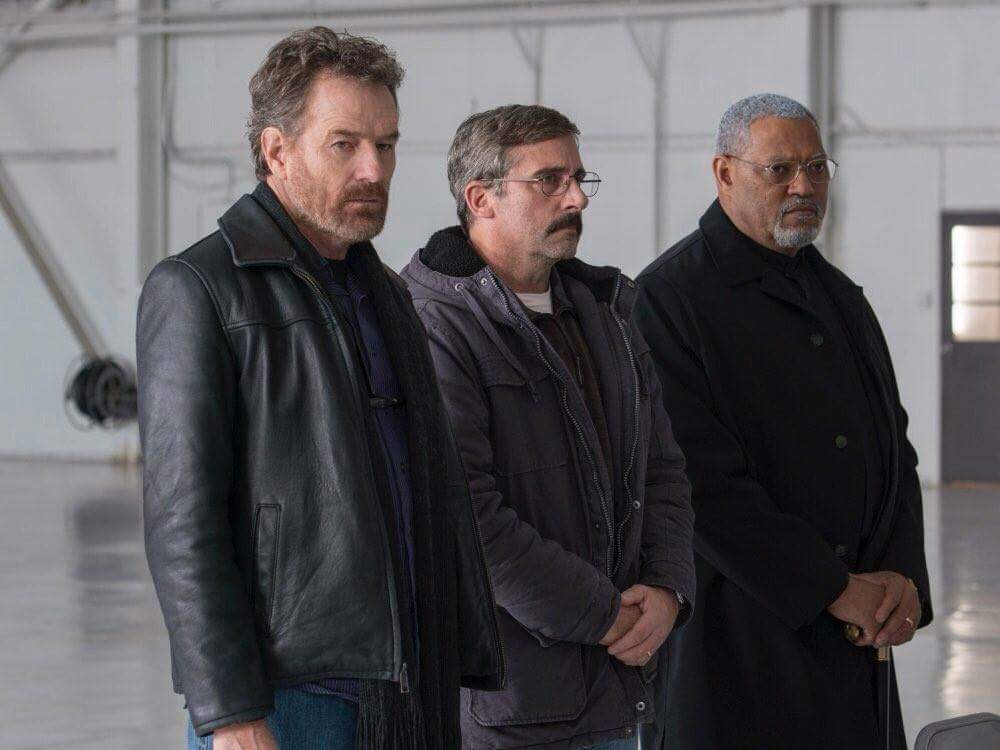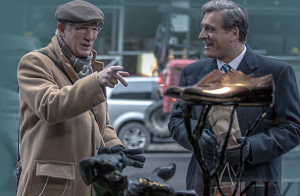Fans of director Richard Linklater will no doubt find his latest project to be very satisfying — and very much in line with his previous work. Last Flag Flying is thematically different from Linklater’s earlier films, but it still has a distinct sensitivity and humanity that can be found in his past box-office hits (Boyhood, Dazed and Confused, and School of Rock). As the dust of critical acclaim and hyped-up expectation settles, Last Flag Flying emerges as a well-made and nuanced film that finds its strengths in examining grief and patriotism.
The premise of the movie is extremely straightforward. In the wake of his young son’s death, Larry “Doc” Shepherd (Steve Carell), a former member of the Navy, seeks the help of two Marines he met during his service in Vietnam. Sal Nealon (Bryan Cranston) and Richard Mueller (Laurence Fishburne) accompany Larry as he transports the body of his son, who was killed during his tour in Baghdad, back to New Hampshire, rather than Arlington, for burial. The three men learn that Larry Jr. was not killed in combat, but rather during a regular run with his buddies for drinks when a deranged citizen shot him in the back of the head. This contrasts with the official account given by the government, which stated, very ambiguously, that Larry Jr. was a hero who sacrificed his life for his country during an ambush. Charlie Washington (J. Quinton Johnson), a young marine and Larry Jr,’s best friend, also travels with the three men and the body as they make their way to Portsmouth, NH.
This two or three-day-long affair is examined in detail throughout the duration of the two hour film. The result is a deeply saddening but surprisingly humorous road trip style drama. Linklater uses humor to highlight the contradictions and idiosyncrasies we experience in situations of immense grief. There is a particularly memorable scene in which Larry, Sal, Mueller, and Washington are gathered in the storage compartment of an Amtrak next to box that carries Larry Jr.’s body. At one point, all of them are in stitches, tears running down their faces as the three older men recount and reminisce about their trips to “Disneyland” (a whorehouse) in Vietnam. This strange contradiction, which is also mirrored in a comical scene in which Sal depicts the revolutionary benefits of “cellular phones” and “minutes” (the film is set in 2003), reflects the multi-faceted nature of grief and life that Linklater is exploring.
Last Flag Flying is not shy in offering criticism in its discussion of the government and military. The film’s setting in 2003 means that shadow of the Vietnam War and the threat of the Iraq War are very prominent for the three veterans. However, this is a veiled theme throughout the movie, as there are never any flashback or actual scenes with military conflict. Instead, the unresolved struggles and memories these men have of the Vietnam War manifest themselves in different ways. Sal turns to alcohol, Mueller to God, and Larry to his wife and son— both of whom are tragically taken away. Larry’s anger towards the government’s lies about the death of his son are reflected in his decision to bury Larry Jr. at home and “as his son, not a Marine.” Larry later decides to retract his initial decision of burying Larry Jr. in his graduation suit instead of his uniform, realizing that his son’s love for his country should be respected. This piques an interesting question regarding the concept of patriotism, especially in the context of Larry’s difficult situation.
One of the more noteworthy aspects of Last Flag Flying is the dynamic between the three veterans. Sal is the loud-mouthed, smart aleck who has a penchant for flouting authority and injecting brevity into tense situations. Mueller is seemingly Sal’s polar opposite; a pastor and “reformed man,” he regularly expresses distaste towards Sal’s comments and behavior, although there is a deep camaraderie among the three that is still present despite the passage of four decades. Larry is the quietest and most reserved of the group, presumably even when he isn’t mourning. The three are perfectly balanced, and their interactions are often what lift the plot from spiraling down a tunnel of grief.
While Linklater is able to skillfully distill almost any scene into its most human elements, the unanticipated effect of this venture is that certain dialogues and events are too mundane to fully live up to their potential for a lasting impact. The film drags in instances, and the audience starts to wonder when things might pick up. Much like the character of Larry, Last Flag Flying ends up being a little too humane and reserved–almost to a point to being a bit unmemorable. This may be a noticeable shortcoming, but it is not overpowering for more attentive viewers who are able to appreciate Linklater’s genius use of subtlety throughout the whole film.
Last Flag Flying is a solid success, but not a triumph. Linklater and the cast are able to create a deeply perceptive and vulnerable account of one man’s grief, while also examining and questioning the concept of patriotism. Though the film has deservedly enjoyed widespread critical acclaim, its overall unforgettable nature is slightly disappointing.





